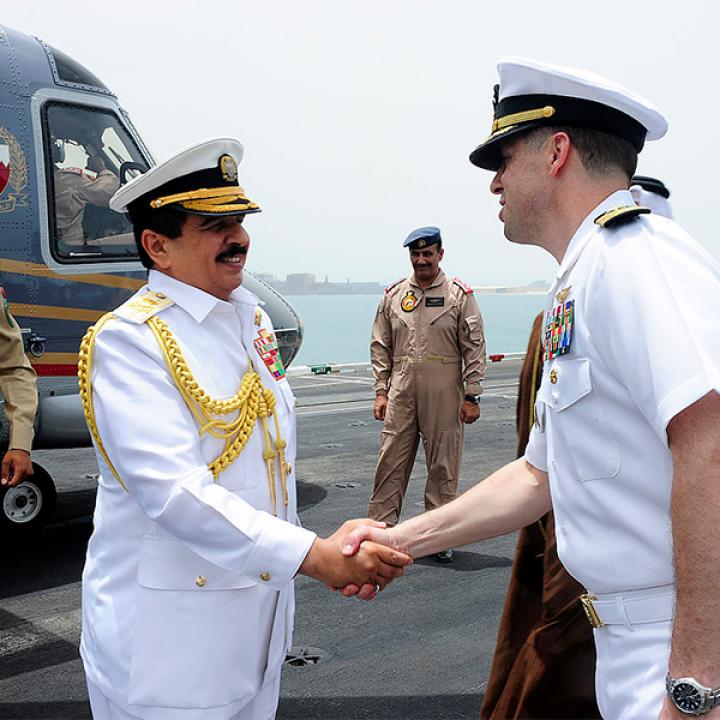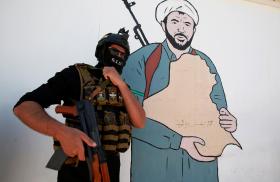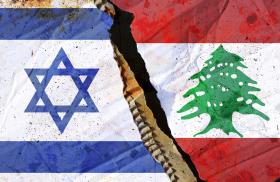

Bahrain's appointment of the reconciliation-minded crown prince as first deputy prime minister is a sign of progress, despite the potential for opposition from royal hardliners and overreaction in Washington.
On March 11, King Hamad bin Isa al-Khalifa of Bahrain announced the appointment of his eldest son, Crown Prince Salman, to the new position of first deputy prime minister, with responsibility for monitoring the performance of several government agencies. The move was seen as a signal to the political opposition that the palace is willing to compromise in the crisis that began two years ago, when government forces cracked down on mainly Shiite Bahrainis calling for a greater political voice. The crown prince is viewed as more receptive than other royals to reconciliation efforts that could defuse ongoing tensions. As Washington continues looking for ways to help mediate the crisis, it should avoid rash moves that would only embolden the island's hardliners and jeopardize the U.S. Fifth Fleet headquarters, located in the capital.
BACKGROUND
Bahrain has been wracked by near-daily violence since early 2011. Originally imitating Tunisia and Egypt's Arab Spring demonstrations, the island's protests quickly developed into sectarian affairs. The majority of Bahrain's roughly one million citizens are Shiite, but the Khalifa royal family is Sunni, as are most members of the military and security forces. On February 14, 2011, troops moved against demonstrators who had occupied the iconic Pearl Monument traffic circle in downtown Manama, while neighboring Saudi Arabia and the United Arab Emirates sent additional forces to protect strategic installations.
Clashes have persisted since that crackdown, and reconciliation has been slow and fitful. In June 2011, under pressure from the United States and other Western countries (including Britain, the former colonial power), the king established an international commission of inquiry, which produced a series of recommendations designed to ease tensions. A year later, the inquiry's chairman, Egyptian American jurist Cherif Bassiouni, expressed disappointment with the progress of his suggested reforms. Meanwhile, the Shiite members of parliament, who had resigned in protest at the 2011 clampdown, were replaced in by-elections.
In recent weeks, a national dialogue was established to bring together representatives of the government, the parliament, pro-government Sunni political groups, and the mainly Shiite opposition groups. (Some Shiites oppose the talks as a waste of time and support the young men -- loosely grouped under the moniker "February 14" -- who regularly skirmish with police.) The seventh session of dialogue was held on March 10, and the eighth is scheduled for March 13. So far, the deliberations have been limited to negotiating the agenda.
SAUDI INVOLVEMENT
The 2011 crackdown was apparently prompted by Saudi concerns that the Bahraini royal family might be overthrown by pro-Iranian Shiite mobs. Riyadh also worried that Manama would make too many concessions to the Shiites, prompting unrest by their coreligionists next door (Shiites form a local majority in Saudi Arabia's oil-rich Eastern Province, which is joined to Bahrain by a sixteen-mile causeway). Ironically, Riyadh is now one of the main parties encouraging Bahrain's latest political discussions. The Saudis have apparently come to realize that even more serious consequences could arise from lack of dialogue and the almost-nightly "Molotov cocktail parties" (as the clashes between February 14 youths and security forces are known to expatriates living on the island).
Currently, Riyadh is pressuring both sides, urging the Bahraini royals to make concessions and the main Shiite opposition coalition (al-Wefaq) to be reasonable in its demands. On March 8, the Financial Times reported that an unidentified "Saudi politician" (an oxymoronic label if there ever was one) had been in direct, informal contact with al-Wefaq. The official in question is believed to be an advisor to Prince Mitab bin Abdullah, one of the king's sons and commander of the Saudi Arabian National Guard (SANG), whose paramilitary forces formed the bulk of the Saudi contingent that intervened in Bahrain in 2011. Meanwhile, Riyadh's leverage over the Bahraini royal family includes control of shared revenue from an offshore Saudi oil field.
BAHRAIN'S ROYAL SCHISMS
The recent political developments offer rare insights into differences between the Bahraini royals. In a February 20 Wall Street Journal report, various "palace figures" described internal divisions about the status of reconciliation efforts. The leaks -- which apparently came from the crown prince's camp and were characterized as "an unusual breach of royal family discipline" -- blamed the lack of progress on the Khawalids, a group of royals with a hardline Islamist power base and effective control over "Bahrain's security and intelligence forces, the judiciary, and the king's royal court."
The reality might even be more complex, with some local observers identifying no fewer than four royal factions. On the left is Crown Prince Salman, who is the most willing to talk with opposition politicians. To the right of him is King Hamad, who recognizes the need for political compromise but has a reputation for vacillation. Further to the right is the king's uncle, Prime Minister Khalifa bin Salman, a crucial figure with immense influence who is considered the godfather of the hardliners (juxtaposed portraits of him, the king, and the crown prince can be found all over Bahrain, on billboards and in government offices and hotels). Sheikh Khalifa has served as premier for more than forty years and may feel undermined by the crown prince's new appointment. Meanwhile, the Khawalids are furthest to the right; they reputedly hold bigoted views of Shiites and oppose all political concessions.
Although the king and crown prince have spoken in the past of establishing a constitutional monarchy similar to Britain's, they appear reluctant to relinquish real power. Some have proposed that any formula agreed to in the national dialogue should be put to a public referendum, but that would require agreement on voting rights -- yet another issue marred by sectarian acrimony. Shiites have accused the government of giving male Sunni foreigners and their families an unfairly quick route to citizenship via service in the security forces. As a result of such measures, the Sunni-Shiite ratio among the island's citizenry has changed from an estimated 30:70 to around 45:55 in recent years.
SAUDI DIVISIONS
Developments in Bahrain also suggest policy differences in the House of Saud, where King Abdullah (age 90) is in increasingly fragile health and Crown Prince Salman (77) is suffering from dementia. One faction of the Saudi royal family -- including Prince Mitab and his uncle, newly appointed second deputy prime minister Prince Muqrin bin Abdulaziz -- is styled as reformist, in contrast to the more-authoritarian sons of the late Prince Nayef: Interior Minister Prince Muhammad and his elder brother, Prince Saud, who was recently made governor of the Eastern Province. The latter two are said to prefer the tighter style of control for which their father was infamous, though perhaps a milder version. Mitab also draws support from Khaled al-Tuwaijri, a key non-royal who runs the king's court.
U.S. ROLE
Washington is keen to encourage almost any political discussions that might break the stalemate of the past two years. The United States has already backed training in reconciliation and negotiation skills for Bahraini opposition figures, including visits to Northern Ireland, where their tutoring has been directed by Jonathan Powell, former chief of staff to Tony Blair.
The most crucial U.S. challenge is encouraging royal political concessions without jeopardizing the Fifth Fleet headquarters, a vital and probably irreplaceable regional installation that helps secure energy transit routes out of the Persian Gulf. Occasionally, politicians and pundits in Washington suggest that threatening to close the base would coerce the al-Khalifas into meaningful compromise with the opposition. But this is wrong-headed -- only the Molotov-throwing Shiite youths of the February 14 movement want U.S. forces to leave. The current demonstrations, though troublesome, do not target U.S. citizens; in fact, the mainstream Shiite opposition wants the Navy to stay, seeing the U.S. presence as a welcome restraint on the potential excesses of the royal security forces.
Although Washington should encourage the still-slow dialogue, recent optimism must be tempered by caution given the policy differences opening up in the Bahraini and Saudi royal families, particularly since Iran might take advantage of any fresh deadlock. The Khawalid faction in Manama may even relish that prospect as a means of clarifying the royal family's predicament and justifying the hardline path. To avoid emboldening this faction, Washington should resist the temptation to openly discuss withdrawing the Fifth Fleet headquarters.
Simon Henderson is the Baker fellow and director of the Gulf and Energy Policy Program at The Washington Institute.


